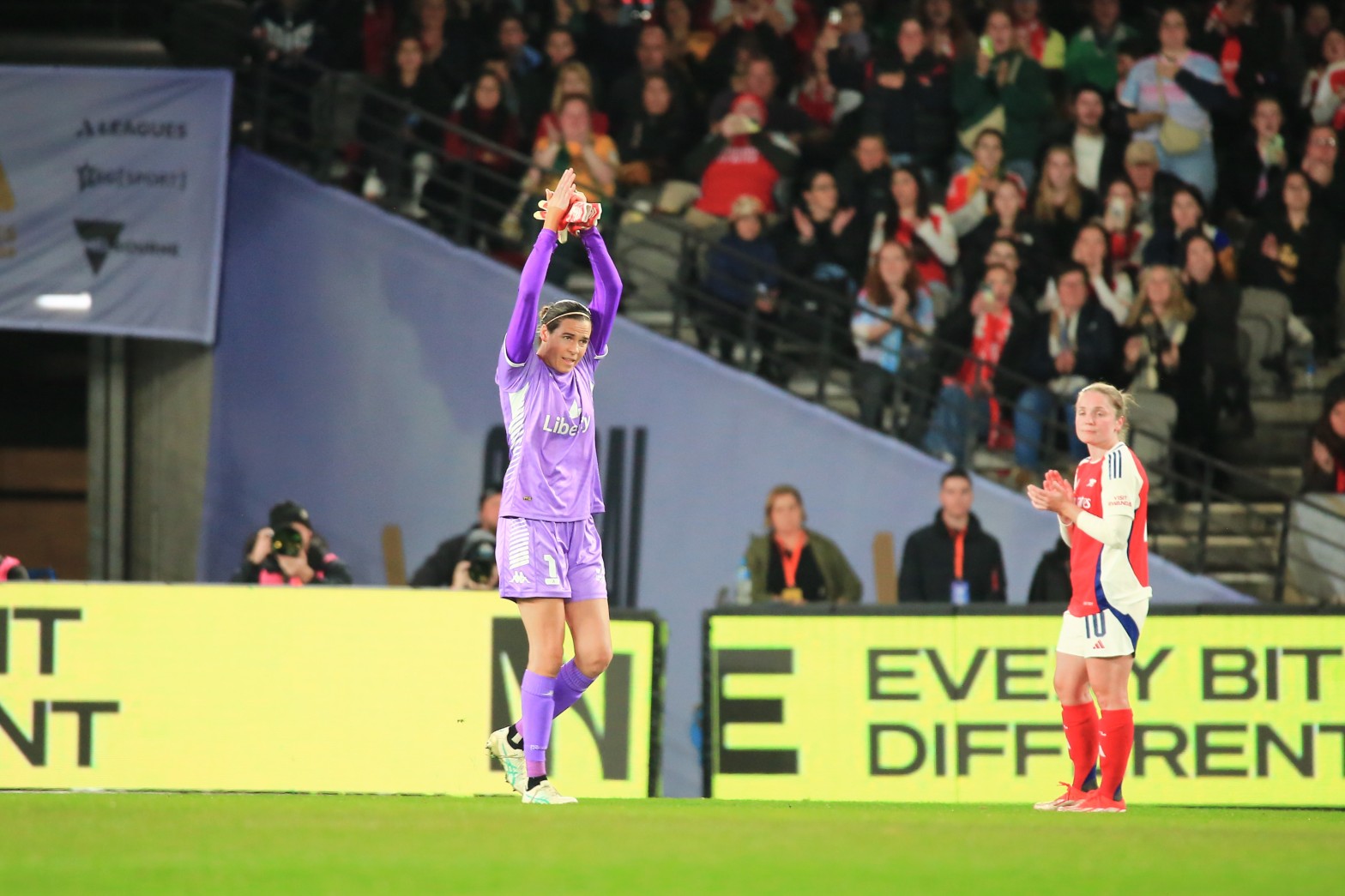By Genevieve Henry and Kieran Yap (5/6/24).
With Lydia Williams set to retire from international football, Impetus Football looks back at the impact she had during her career, and the legacy she leaves on and off the field.
When Lydia Williams made her debut for The Matildas it was a different era. Five years on from the Sydney Olympics, crowds for the Australian national team were made up of a handful of die-hard fans, family, and friends. She retires with The Matildas having sold out stadiums around the country, with 103 caps and with the game in a much better place than when she arrived.
Her career has spanned four generations of players, and for much of those 19 years, she has been the number one choice to wear the gloves on matchday. Australia has long been blessed with great goalkeepers and she comfortably sits among the very best in both longevity and ability.
For many adult Matildas fans, Lydia Williams IS their goalkeeper. She took the baton from Melissa Barbieri and had been one of the most constant names on the teamsheet in the most visible and transformative period in Australian football history.
Williams was the starting goalkeeper for two World Cup’s but has been named in four tournaments. She was on the pitch when The Matildas became the first Australian team to win a knockout match at a World Cup, and she was on the field long after the final whistle when they went one further and made the semi final of 2023. She has been a standard bearing player for a long time, many fans do not really remember the game without her, and none of the current side know a locker room without her.
Williams may be a household name, but the longevity and success can be misleading. Although she was a prodigy, for many reasons, this was not an obvious path like it would have been for a young boy.
The result is that she leaves the game as an inspiration to the global football community but also one much more local.
Growing up in Kalgoorlie like Williams, Perth Glory’s Tanika Lala did not have access to the same facilities her future peers did, and looked to Williams for inspiration.
“There is quite a big difference from playing football regionally (than what) I have experienced from the main city,” Lala told Impetus.
“Cities provide greater resources and opportunities, such as developmental academies and increased exposure.”
“Growing up in Kalgoorlie, I was not exposed to any academies…it was difficult for me to adjust to the quality of football in Perth. I had to work hard and push myself to catch up technically, physically, and mentally. It goes to show Lydia’s talent as she got national attention at a very young age.”
“That is very impressive coming from the Goldfields.”
Williams did not mean to be a goalkeeper. After spending her childhood playing football alongside Aussie Rules in Kalgoorlie, she and her family moved to Canberra. When she joined her local team, the only position available was in the net. From there, she quickly rose to prominence, making her debut for her country only six years after she first donned the gloves.
Williams was appearing for the Australian national team before the W-League was even created and was only second Indigenous player at the time of her debut.
From empty stadiums when she was 15 to sellout crowds every time the Matildas play at home, Williams has been there through it all.
During her club career, Williams has played with some of the world’s best teams, such as Arsenal and Paris Saint-Germain. Like many Australians for much of the 2010s, Williams played in the NWSL as well as the W-League, starting most games for every club she graced. Her time with Melbourne City from 2016-2020 was perhaps some of her most impressive work, earning accolades such as Goalkeeper of the Year.
But, as much as one can say about her career, what makes Williams so special is her character. Highly respected and beloved among her peers, Williams’ leadership and compassion set her apart.
Even the timing of her retirement displays the team-first attitude that she is known for. With Australia set to host another international tournament, the 2026 Asian Cup, she could be forgiven for trying to hold on for one last dance. Before injury, her form at Melbourne Victory showed that her powers had not yet faded.
Some tough choices will need to be made after the Paris Olympics, Williams made the call herself, when she could be forgiven for going on another two years to chase a trophy.
It is a brave decision to step away when the game the most popular it has ever been, and when her matchday pay has never been higher. But Williams has never been about herself, goalkeepers cannot be. They put their hand up for the most criticized and solitary role in the sport, ready to shoulder all the blame for a loss and let the strikers take the glory for a win.
As one of the first women to join the PFA, the Australian players’ union, Williams has always advocated for the rights of her fellow players as well as girls inspired by them. She was one of the leaders in the Matildas successful strike in 2015 to earn them equality with the Socceroos. In her press conference on Sunday, Williams shared, “the one thing that I really wanted was that this team really fights for what they believe in, and we’ve really seen that throughout the years – that it’s okay to fight for things.”
She is a huge advocate for Indigenous women in sport and has used her platform to bring attention to the importance of visibility for future generations. A proud Noongar woman, Williams’ has always encouraged and hoped that her career has inspired young Aboriginal girls and boys to embrace their identity and shoot for the stars.
Williams is leaving The Matildas in a better place than when she first played, and a lot of that is thanks to her bravery, advocacy, and activism. “I want that culture and environment to continue and I think it will. The girls have a fire in them, we’ve brought people in to lead the team in a positive way and really make sure that it is about results and the team and the culture and the Matildas as a whole.”
This is a footballer and a person who put the shirt, The Matildas, and her teammates first for almost two decades. Her legacy on and off field is secure. But the final chapter is not yet written, and Impetus Football wishes her the best in whatever comes next for Australia’s Number One.

